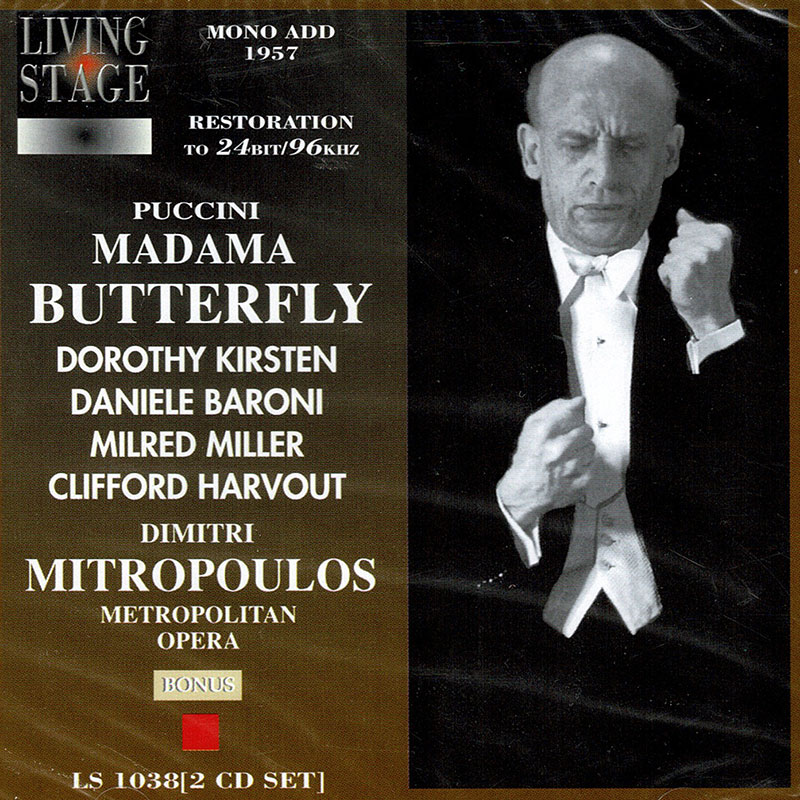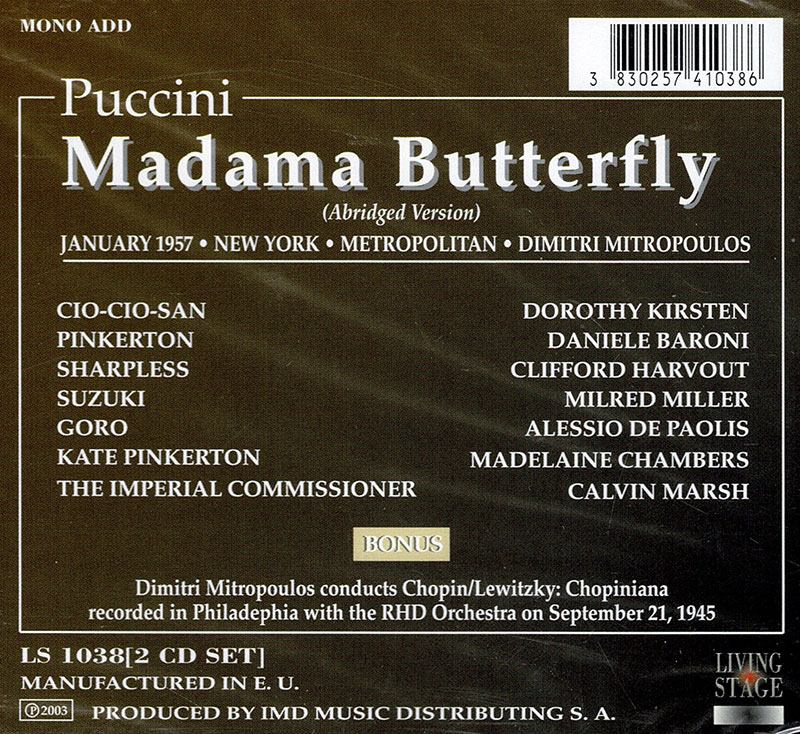Logowanie
Dlaczego wszystkjie inne nie brzmią tak jak te?
Chai Lang, Fan Tao, Broadcasting Chinese Orchestra
Illusive Butterfly
Butterly - motyl - to sekret i tajemnica muzyki chińskiej.
SpeakersCorner - OSTATNIE!!!!
RAVEL, DEBUSSY, Paul Paray, Detroit Symphony Orchestra
Prelude a l'Apres-midi d'un faune / Petite Suite / Valses nobles et sentimentales / Le Tombeau de Couperin
Samozapłon gwarantowany - Himalaje sztuki audiofilskiej
PROKOFIEV, Stanislaw Skrowaczewski, Minneapolis Symphony Orchestra
Romeo and Juliet
Stanisław Skrowaczewski,
✟ 22-02-2017
BARTOK, Antal Dorati, Philharmonia Hungarica
Dance Suite / Two Portraits / Two Excerpts From 'Mikrokosmos'
Samozapłon gwarantowany - Himalaje sztuki audiofilskiej
ENESCU, LISZT, Antal Dorati, The London Symphony Orchestra
Two Roumanian Rhapsodies / Hungarian Rhapsody Nos. 2 & 3
Samozapłon gwarantowany - Himalaje sztuki audiofilskiej
Winylowy niezbędnik
ClearAudio
Cartridge Alignment Gauge - uniwersalny przyrząd do ustawiania geometrii wkładki i ramienia
Jedyny na rynku, tak wszechstronny i właściwy do każdego typu gramofonu!
ClearAudio
Harmo-nicer - nie tylko mata gramofonowa
Najlepsze rozwiązania leżą tuż obok
IDEALNA MATA ANTYPOŚLIZGOWA I ANTYWIBRACYJNA.
Wzorcowe
Carmen Gomes
Celebrating the art and spirit of music - vol. 5 - Reference Songs
- CHCECIE TO WIERZCIE, CHCECIE - NIE WIERZCIE, ALE TO NIE JEST ZŁUDZENIE!!!
Petra Rosa, Eddie C.
Celebrating the art and spirit of music - vol. 3 - Pure
warm sophisticated voice...
SAMPLER - STS DIGITAL, Gregor Hamilton
Celebrating the art and spirit of music - vol. 2 - Love songs from Gregor Hamilton
...jak opanować serca bicie?...
SAMPLER - STS DIGITAL
Celebrating the art and spirit of music - vol. 1 - Leonardo Amuedo
Największy romans sopranu z głębokim basem... wiosennym
Lils Mackintosh
Celebrating the art and spirit of music - vol. 4 - A Tribute to Billie Holiday
Uczennica godna swej Mistrzyni
PUCCINI, Dorothy Kirsten, Daniele Baroni, Mildred Miller, Clifford Harvout, The Metropolitan Opera Orchestra and Chorus
Madama Butterfly - 1957

"Dorothy Kirsten made her professional concert debut in a stage show at the New York World's Fair. She was also reunited with Grace Moore, who recommended her to the Chicago Grand Opera, where Miss Kirsten made her operatic début as Pousette in Massenet's MANON in 1940. Miss Kirsten sang 15 minor roles during her first season, and the following year shared the stage with Miss Moore in a Chicago performance of LA BOHEME, singing Musetta to Miss Moore's Mimi. In 1942, Miss Kirsten began to sing leading roles with the San Carlo Opera Company, in Washington and New York City. She made her New York City Opera debut in 1943, and by 1945 had performed with the San Francisco Opera, the New York Philharmonic and other major orchestras. Starting in September 1943, she had her own radio program, 'Keepsakes’, which ran for a year. Miss Kirsten's Metropolitan Opera debut, as Mimi in LA BOHEME on 1 Dec., 1945, was a critical success, and was the start of a 30-year association with that house. In 1971, when she celebrated her 25th anniversary with the company, she reminisced about that debut, and recalled that Miss Moore sat in the first box, at the side of the stage, and threw roses to her. When Miss Moore died in a plane crash in Denmark in 1947, Miss Kirsten sang Schubert's 'Ave Maria' at her funeral. Miss Kirsten's career was centered in the United States, but she did tour Europe and, in 1962, the Soviet Union. There, besides giving recitals, she sang Violetta in a Bolshoi Opera performance of LA TRAVIATA, to considerable acclaim, even though, as she said later, she had to go on without the benefit of a stage rehearsal. During her years at the Met, Miss Kirsten sang most of the important Puccini roles, including the title roles in MANON LESCAUT, TOSCA and MADAMA BUTTERFLY, and she starred as Minnie in a revival of LA FANCIULLA DEL WEST that helped restore the work to the repertory. She prepared for the title role in LOUISE by going to France to study it with the composer. She also worked with the composer Italo Montemezzi on L'AMORE DEI TRE RE before she performed it in San Francisco and at the Met. In addition to the Puccini heroines, her repertory included the female leads in Gounod's ROMEO ET JULIETTE and FAUST, Leoncavallo's PAGLIACCI and Verdi's LA TRAVIATA. She sang in the American premieres of Walton's TROILUS AND CRESSIDA and Poulenc's DIALOGUES DES CARMÉLITES, both in San Francisco. Miss Kirsten's voice was not huge, but she used it gracefully throughout her long career. When she gave her farewell performance at the Met, on 31 Dec., 1976, Allen Hughes wrote in THE NEW YORK TIMES that 'she sang and acted the part of Tosca with the vocal control and dramatic acuity of a prima donna in mid-career’." -Zillah D. Akron “Eugenio Fernandi was born in Pisa and raised in Turin, where he began his vocal studies with Aureliano Pertile. He later entered the opera school at La Scala in Milan, and began appearing there in small roles. His first major role was as Giovanni Battista in Virgilio Mortari's LA FIGLIA DI DIAVOLO in 1954, followed by the Duke in RIGOLETTO and Pinkerton in MADAMA BUTTERFLY. He also sang with success at La Fenice in Venice, the Maggio Musicale Fiorentino in Florence, and the Teatro San Carlo in Naples. In 1957, he made his début at the Vienna State Opera as Cavaradossi in TOSCA, later singing Alfredo Germont, Rodolfo, Riccardo, and Radames. He appeared as Don Carlos at the Salzburg Festival, in 1958 and 1960. He sang at all the major Italian houses and made many guest appearances abroad, especially in France, Switzerland, South America and the United States. His principal roles included Pinkerton, Cavaradossi, Calaf, Rodolfo, Alfredo Germont, Don Carlos, Radames, Gounod's Faust and Saint-Saëns' Samson. He joined the Metropolitan Opera as a leading tenor on 19 February, 1958, débuting there as Pinkerton. Of that performance, a 3 March, 1958, TIME MAGAZINE review noted that Fernandi ‘belted out thundering, on-target salvos of sound that rocked the house’, further praising that ‘physically and vocally it is surely the handsomest BUTTERFLY ever mounted on a U.S. stage’. From 1958 to 1971, Fernandi sang eight seasons with the Met in thirteen roles, including Mario Cavaradossi, Edgardo, Enzo, Ismaele, Arrigo, etc.” - Echoes-Sentinel, 15 August, 1991 “Conductor Dimitri Mitropoulos stood apart from the European traditions that dominated first-rank American orchestras for much of the twentieth century. After attending the Athens Conservatory, where he studied piano and composition, his opera BÉATRICE was presented there. The French composer Saint-Saëns was in the audience, and was so impressed that he arranged a scholarship that enabled the 24-year-old to study composition with the Belgian composer Paul Gilson and piano with Busoni in Berlin. Busoni persuaded him to abandon composition and concentrate on becoming a conductor. From 1921 to 1925, Mitropoulos assisted Erich Kleiber at the Berlin State Opera and on Kleiber's recommendation, was appointed conductor of the Hellenic Conservatory Symphony Orchestra in Athens. In 1927, he became conductor of the Greek State Symphony Orchestra and in 1930 was engaged to conduct the Berlin Philharmonic Orchestra, where he instituted the practice of conducting from the piano. In 1937 Mitropoulos succeeded Eugene Ormandy as musical director of the Minneapolis Symphony Orchestra. He became a U.S. citizen in 1946, and remained in America until 1959. After 12 years in Minneapolis, he was invited to share the conductorship of the New York Philharmonic Orchestra with Stokowski, becoming its conductor when Stokowski resigned in 1950. Mitropoulos resigned the post after sharing the podium with Leonard Bernstein, his co-principal conductor, in the Orchestra's 1958 tour of Latin America. From 1954, he was a dynamic force as Bruno Walter's successor at the Metropolitan Opera, where he introduced many new operas, including ones by Richard Strauss and Samuel Barber. Mitropoulos never conducted his own works, but considered his best composition to be a Concerto Grosso written in 1929. He lived simply and took little part in social activities. His conducting style was passionate, highly-charged and demonstrative; he had a phenomenal memory and rarely used a baton. He programmed much modern music and particularly admired Schönberg and the Second Viennese School, such as Webern and Berg, as well as twentieth century American and British composers. His recording of Mahler's First Symphony made with the Minneapolis Symphony Orchestra in 1941 was the first ever made in the U.S. of that work, and Mitropoulos was awarded the American Mahler Medal of Honor in 1950 for his work in promoting the composer's music. He died while rehearsing Mahler's Third Symphony with Toscanini's famous La Scala Orchestra.” - Roy Brewer, allmusic.com
























